Learning objectives
Setup a TAG account with Load balancer endpoint requirements
Configure and use the TAG Load balancer API endpoint to register hosts using curl.
Test the microservice hosts added via the TAG Load Balancer API endpoint.
Prerequisites
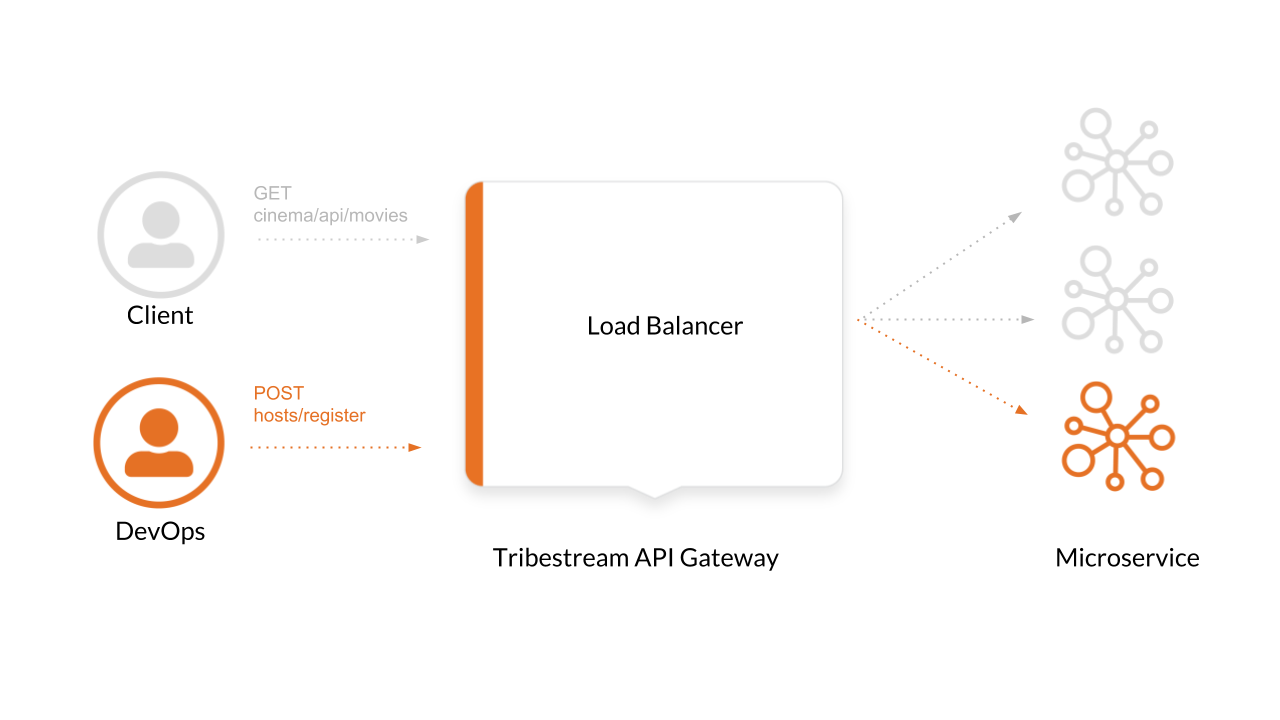
During this guide we are going to lear how to dynamically add hosts to TAG Load Balancer in a DevOps fashion using TAG built-in load balancer API endpoint. In the diagram the main actors are:
DevOps TAG account that has permissions to dynamically add hosts to a TAG Load Balancer.
TAG Load Balancer that is been configured as part of an API Connection
Three deployments of the movie microservice we have been using in previous guides.
For this guide we are going to scale the movie microservice up to three instances with a custom language configuration: English, Spanish and French.
For each microservice instance we are going to use the following names and exposed ports:
movie-api-en (port 3333)
movie-api-es (port 4444)
movie-api-fr (port 5555)
In order to run the three microservice instances we need to open a terminal and execute the following command:
docker run -e LANG=ENGLISH -d -p 3333:9090 --name movie-api-en tomitribedev/movie-api
docker run -e LANG=SPANISH -d -p 4444:9090 --name movie-api-es tomitribedev/movie-api
docker run -e LANG=FRENCH -d -p 5555:9090 --name movie-api-fr tomitribedev/movie-apiUsing curl, we can validate that our microservices are up and running by executing the following commands. Notice that each microservice returns in the payload it’s own Language Configuration.
curl http://localhost:3333/movie-api/api/language
"ENGLISH"
curl http://localhost:4444/movie-api/api/language
"SPANISH"
curl http://localhost:5555/movie-api/api/language
"FRENCH"Open a terminal and execute the following command according to your operating system:
For linux:
docker run -it --net="host" -de LICENSE=accept --name tag-dynamic-lb tomitribe/tribestream-api-gateway tomitribe/tribestream-api-gateway
For OS X and Windows:
docker run -it -e LICENSE=accept --name tag-dynamic-lb -p 8080:8080 tomitribe/tribestream-api-gateway
TAG is ready when you see the following message on the TAG log:
INFO [main] org.apache.coyote.AbstractProtocol.start Starting ProtocolHandler ["http-bio-8080"]
INFO [main] org.apache.coyote.AbstractProtocol.start Starting ProtocolHandler ["ajp-bio-8009"]
INFO [main] org.apache.catalina.startup.Catalina.start Server startup in 18348 msTo detach the container log output, type on the terminal: ctrl+p followed by ctrl+q
you can now open a browser and navigate to: http://localhost:8080/tag
Login into the TAG dashboard using the following credentials: username: admin, password: admin.
If this is not the first time you are login into TAG, you may be redirected straight to the Dashboard page.
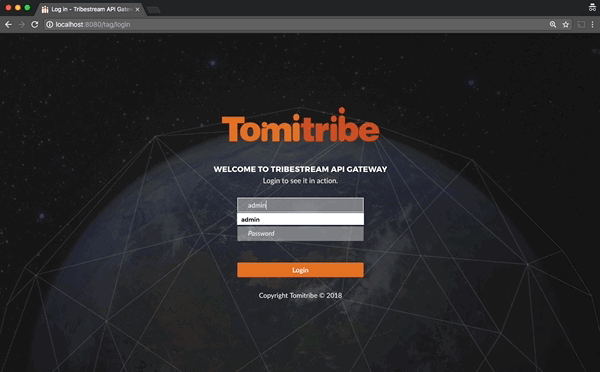
In order to focus the content of this guide to the learning objectives described at the beginning of the guide, we are providing the following commands to import into TAG the necessary entities who’s configuration instructions are already covered in previous guides from the Learning Journey:
An API Connection
Name: movies
Location:
For linux: http://localhost:3333
For OS X and Windows: http://host.docker.internal:3333
A Route
Name: cinema
Mod_Rewrite: RewriteRule "^/?cinema/language$" "%{API:movies}/movie-api/api/language" [P,NE]
An account
Username: devops
Email: [email protected]
Full Name: Development and Operations
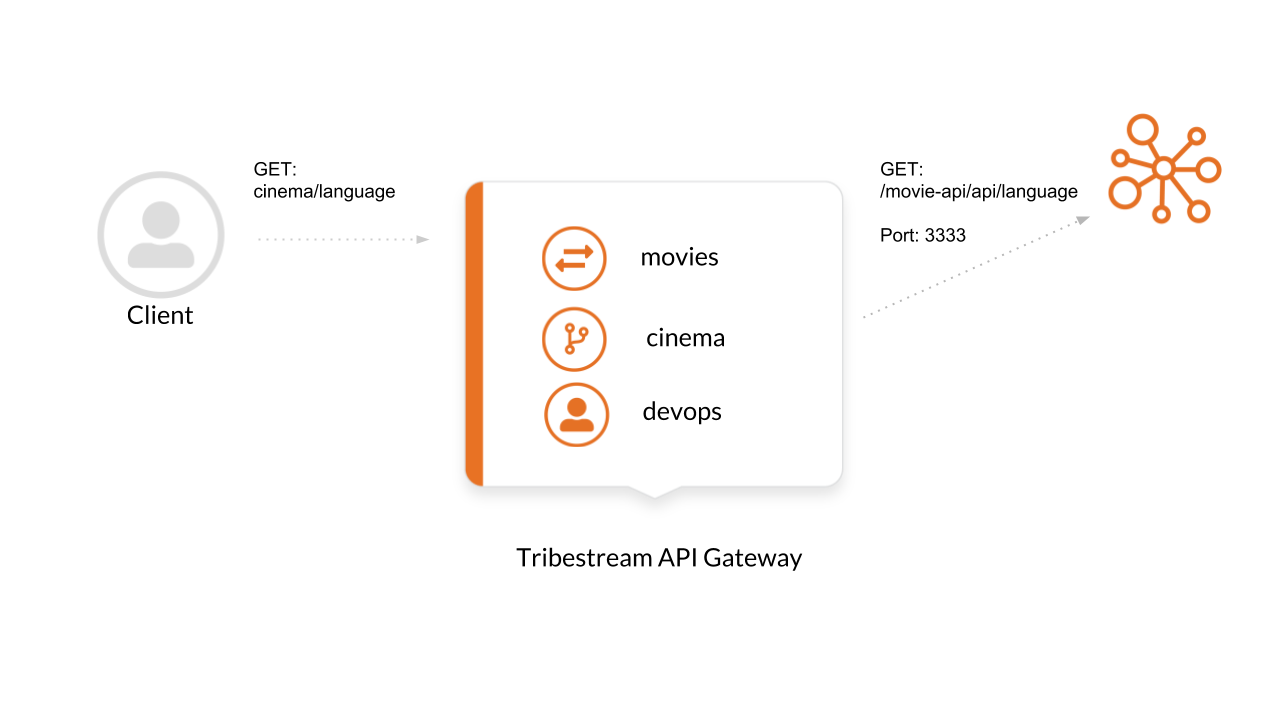
On a terminal execute the following commands:
Import movies API Connection :
For Linux:
curl -X POST http://localhost:8080/tag/api/http/ -H 'Authorization: Basic YWRtaW46YWRtaW4=' -H 'Content-Type: application/json' -d '{ "endpoint": "http://localhost:3333", "name": "movies", "id": "movies" }'For OS X and Windows:
curl -X POST http://localhost:8080/tag/api/http/ -H 'Authorization: Basic YWRtaW46YWRtaW4=' -H 'Content-Type: application/json' -d '{ "endpoint": "http://host.docker.internal:3333", "name": "movies", "id": "movies" }'Import cinema Route:
curl -X POST http://localhost:8080/tag/api/route -H 'Authorization: Basic YWRtaW46YWRtaW4=' -H 'Content-Type: application/json' -d '{ "index": 1, "modRewrite": "RewriteRule \"^/?cinema/language$\" \"%{API:movies}/movie-api/api/language\" [P,NE]", "lastMatchPattern": "^/?cinema/language$", "name": "cinema", "id": "cinema" }'Import devops Account:
curl -X POST http://localhost:8080/tag/api/account/ -H 'Authorization: Basic YWRtaW46YWRtaW4=' -H 'Content-Type: application/json' -d '{ "displayName": "Development and Operations", "type": "CLIENT","sourceType": "ACCOUNT", "id": "devops", "sourceRef": { "id": "gateway-accounts" }, "email": "[email protected]", "username": "devops" }'Notice that at this point only the microservice instance movie-api-en using the port 3333 was configured inside the imported movies API Connection. The other two instances (movie-api-es and movie-api-fr) are going to be dynamically added and configured later in this guide using TAG built-in load balancer API endpoint.
We can now test how TAG is able to route the incoming request to the movie-api-en microservice using the cinema route and the movies API Connection.
In a terminal execute the following command:
curl http://localhost:8080/cinema/languageOutput:
"ENGLISH"To test if the account was successfully imported you can open a browser and navigate to: http://localhost:8080/tag/account/devops. You should be able to see the Development and Operations account detail page.
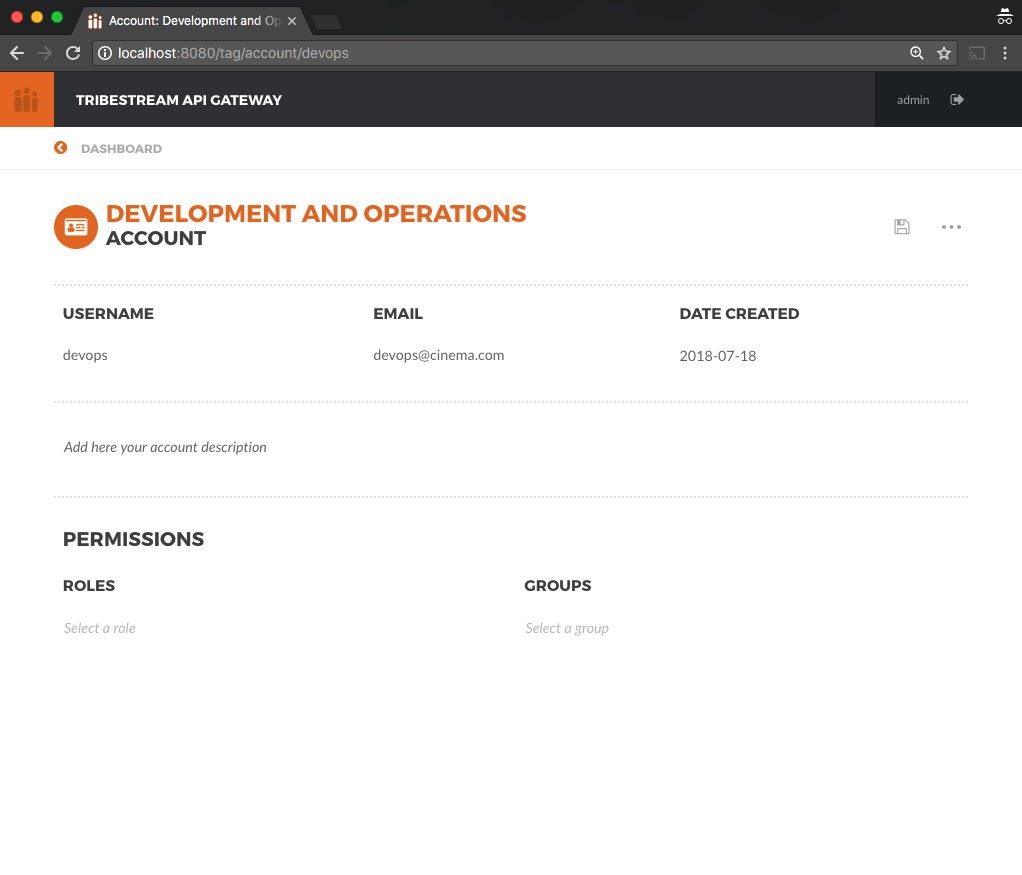
TAG has an out of the box Route called Register Host to Load Balancer, this is the route responsible for:
Match only incoming request with the pattern: /api/http/(.+)/hosts/register. Notice that (.+) will be substituted with the API Connection name we want to update. In our demonstration we will use the imported API Connection: movies.
Enforce authorization. The route will validate that the Account used for the HTTP request has a valid Role. The name of the role should be exactly the same as the API Connection. In our demonstration we need to make sure the user devops has the role movies and also the role gateway-admin that allow the account to consume the TAG REST API.
Enforce authentication. By default the route has HTTP Signatures as the security profile that is going to be enforced. For this demonstration we will use Basic Auth in order simplify the validation scenarios.
Let’s now configure our running TAG instance with the prerequisites described in 2) and 3).
devops accountOpen a browser and navigate to: http://localhost:8080/tag/account/devops and add to the account the following attributes and save the changes:
Password: secretoperation
Roles: gateway-admin, movies
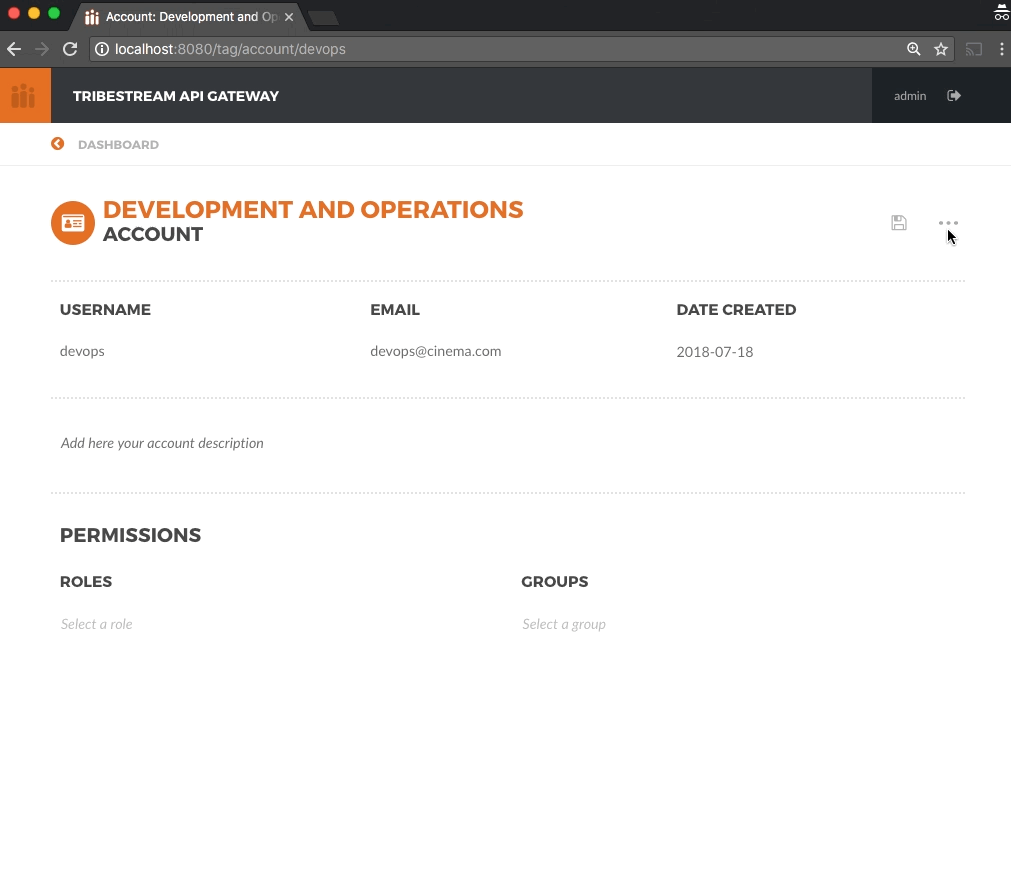
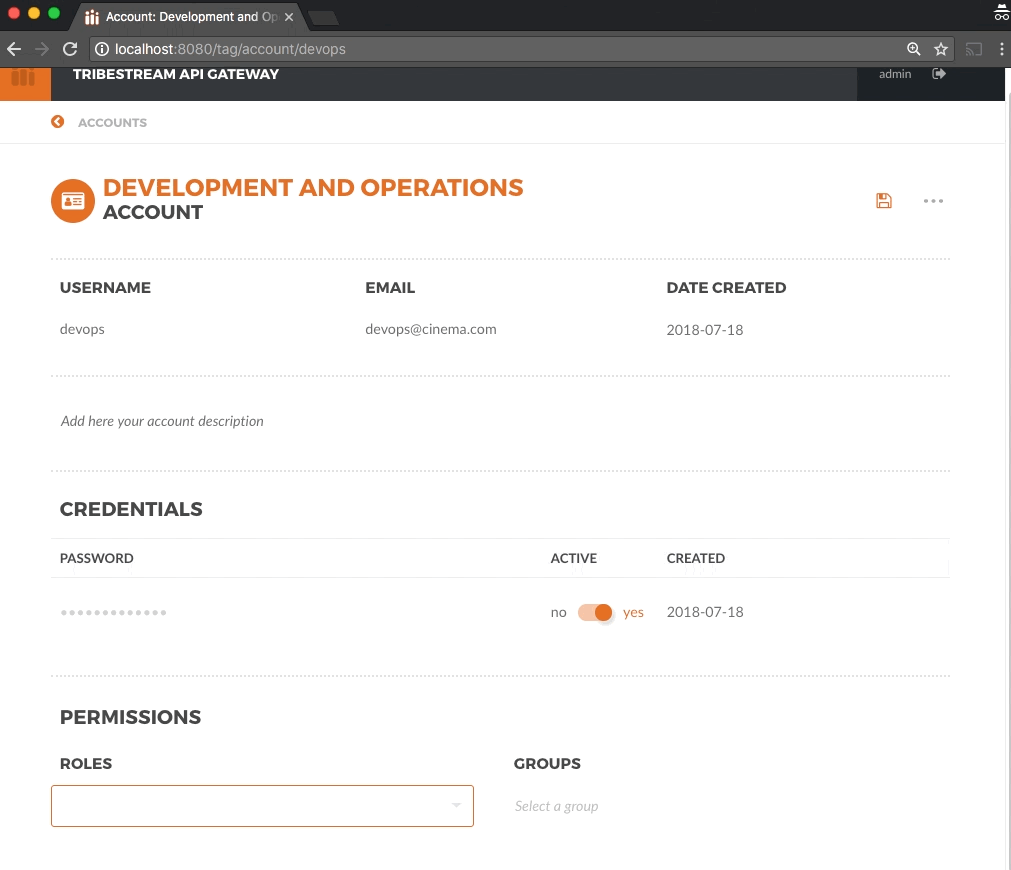
Register Host to Load Balancer RouteOpen a browser and navigate to: http://localhost:8080/tag/route-rewrite/register-host-to-load-balancer, replace current Security Profiles with just Basic Auth Profile and save the changes.
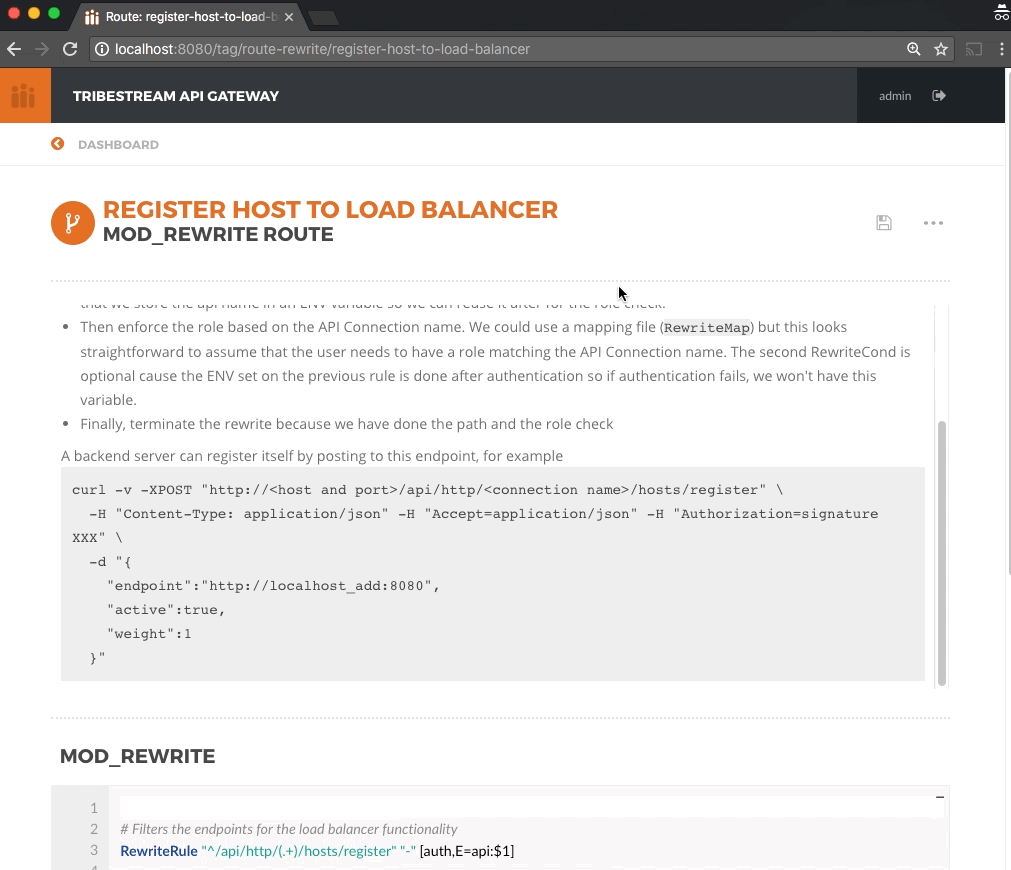
api-movie-es hostWe are going to use curl command to send a request to the TAG Load Balancer API endpoint, notice the reference the request is making to the movies API Connection using the account devops and it’s password secretoperation. This HTTP request is going to register the host for the api-movie-es microservice currently running on port 4444.
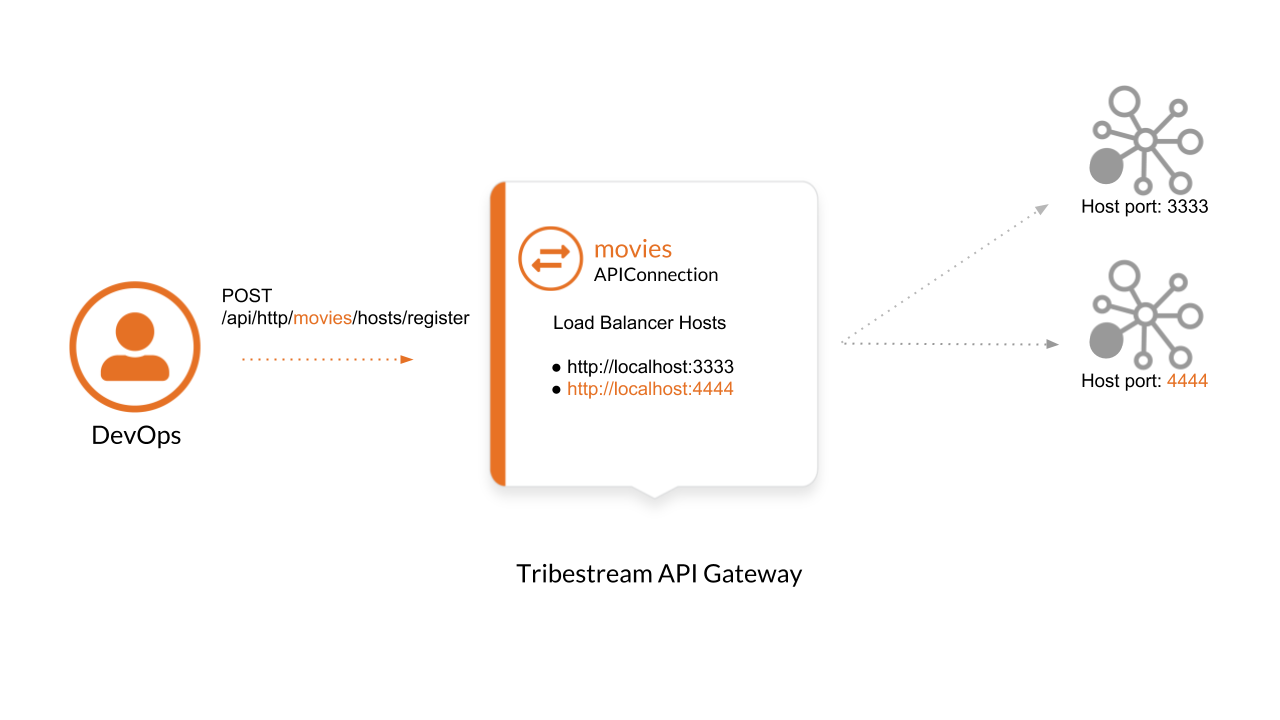
For linux:
curl -X POST \
http://localhost:8080/api/http/movies/hosts/register \
-H 'Accept: application/json' \
-H 'Authorization: Basic ZGV2b3BzOnNlY3JldG9wZXJhdGlvbg==' \
-H 'Content-Type: application/json' \
-d '{
"endpoint":"http://localhost:4444/",
"active":true,
"weight":1
}'For OS X and Windows
curl -X POST \
http://localhost:8080/api/http/movies/hosts/register \
-H 'Accept: application/json' \
-H 'Authorization: Basic ZGV2b3BzOnNlY3JldG9wZXJhdGlvbg==' \
-H 'Content-Type: application/json' \
-d '{
"endpoint":"http://host.docker.internal:4444/",
"active":true,
"weight":1
}'You can verify that the host for api-movie-es on port 4444 was successfully registered by navigating with a browser to http://localhost:8080/tag/http/movies.
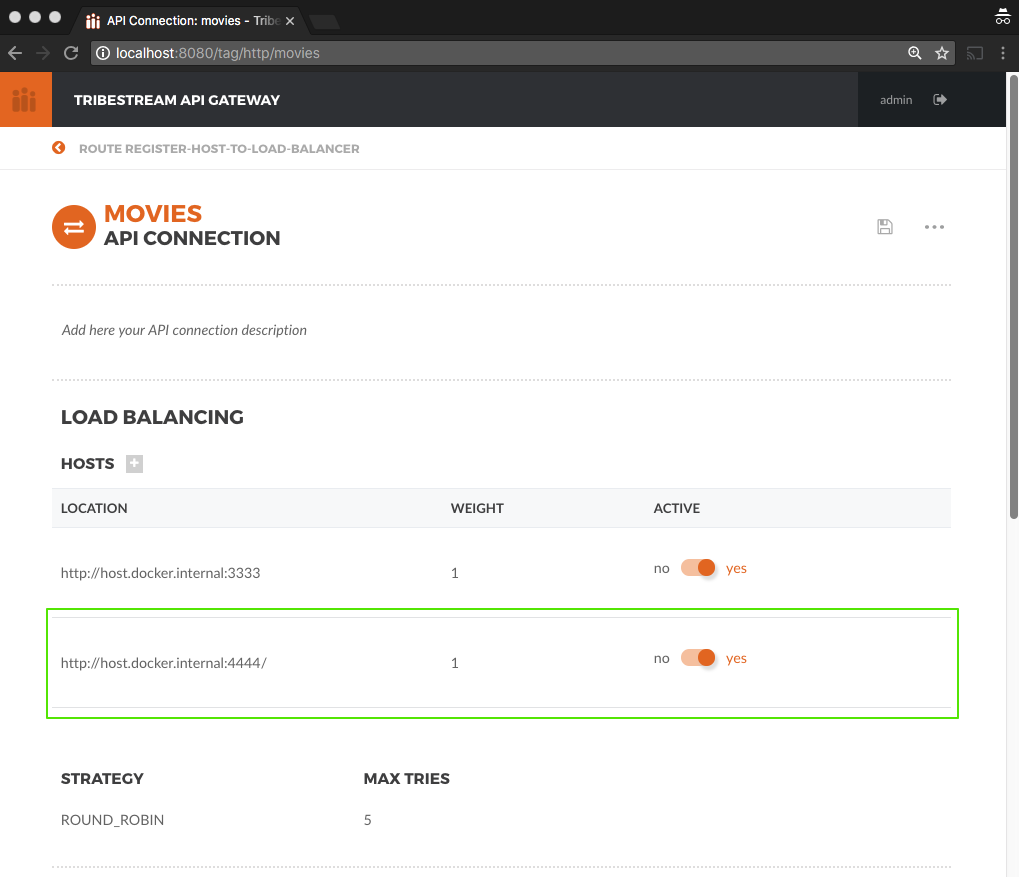
We can now test how TAG is able to route the incoming request to both instance of the movie microservice using the cinema route and the movies API Connection that now hast Load Balancer activated:
In a terminal execute the 4 times the following command:
curl http://localhost:8080/cinema/languageOutput:
"ENGLISH"
"SPANISH"
"ENGLISH"
"SPANISH"api-movie-fr hostWe can repeat the steps we did on the previous section. The curl command to add the host for api-movies-fr (port 5555) into the movies API Connection Load Balancer should be:
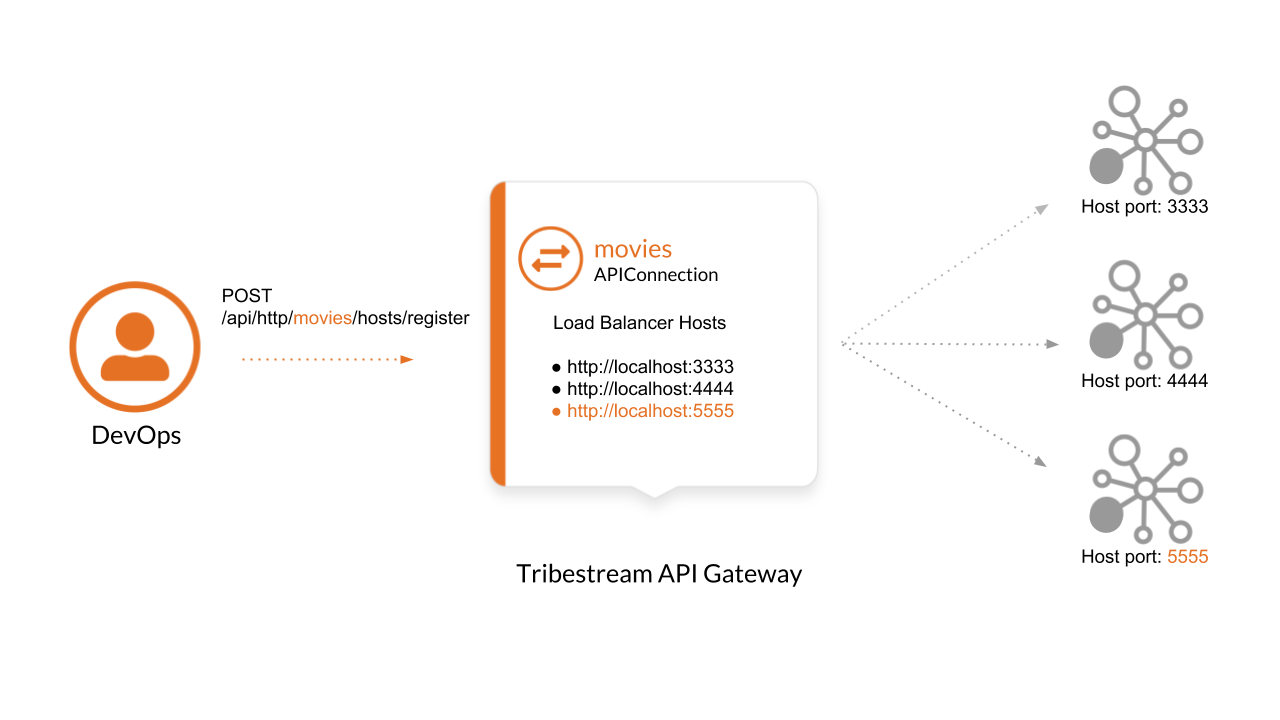
For linux:
curl -X POST \
http://localhost:8080/api/http/movies/hosts/register \
-H 'Accept: application/json' \
-H 'Authorization: Basic ZGV2b3BzOnNlY3JldG9wZXJhdGlvbg==' \
-H 'Content-Type: application/json' \
-d '{
"endpoint":"http://localhost:5555/",
"active":true,
"weight":1
}'For OS X and Windows
curl -X POST \
http://localhost:8080/api/http/movies/hosts/register \
-H 'Accept: application/json' \
-H 'Authorization: Basic ZGV2b3BzOnNlY3JldG9wZXJhdGlvbg==' \
-H 'Content-Type: application/json' \
-d '{
"endpoint":"http://host.docker.internal:5555/",
"active":true,
"weight":1
}'We can now test how TAG is able to route the incoming request to the three instance of the movie microservice using the cinema route and the movies API Connection that now hast Load Balancer activated:
In a terminal execute the 4 times the following command:
curl http://localhost:8080/cinema/languageOutput:
"ENGLISH"
"SPANISH"
"FRENCH"
"ENGLISH"Since both the TAG and the microservices were created with a specific container name, you can now stop the containers from the command line with the following command.
Stopping TAG
docker stop tag-dynamic-lbStopping the microservices
docker stop movie-api-en
docker stop movie-api-es
docker stop movie-api-fr